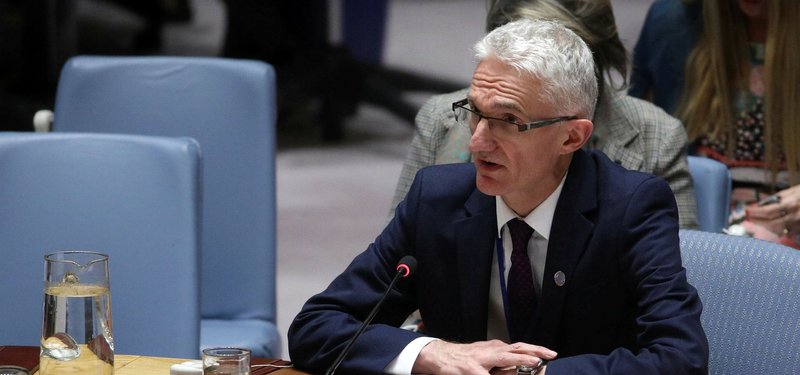
UN humanitarian chief urges aid delivery to Syrians
The U.N. Humanitarian Chief Mark Lowcock urged Syria's warring parties on Wednesday to ensure the delivery of desperately needed aid to Syrians stranded near the border with Jordan and warned again that a major military operation in Idlib would be a humanitarian catastrophe.
- Middle East
- Anadolu Agency
- Published Date: 12:38 | 31 January 2019
- Modified Date: 12:39 | 31 January 2019
The UN humanitarian aid chief has reiterated the importance of sustaining Turkey-Russia agreement on Syria's Idlib to help reduce the fighting and airstrikes.
In a statement, United Nations Emergency Relief Coordinator Mark Lowcock appealed for international funding, backed by UN Security Council support for safe aid delivery.
"[UNSC support would] alleviate the conditions faced by millions struggling for survival amidst rain, snowfall and freezing temperatures across the still war-torn nation," he told the Security Council.
"[…] January saw an increase in fighting between non-State armed groups, placing civilians at risk and resulting in injury and death," Lowcock noted.
"Today I reiterate the importance of sustaining the Russia-Turkey agreement and I remind you that a large-scale military operation in Idlib would have catastrophic humanitarian implications," he said.
Turkey and Russian brokered a deal to create a demilitarized buffer zone in Idlib last September which helped reduce the military fighting in the region.
Lowcock said that weather has been difficult for the people in Idlib where the "risk of military escalation continues to loom".
"The harsh weather is destroying the makeshift shelters and forcing tens of thousands more people to move," he added.
"We have raised $81 million so far, which has allowed us to help 1.2 million people. Continued support is critical to ensuring that all those in need can be reached," he said in his appeal for more funds to help war-torn Syrians.
The UNSC had extended authorization for the cross-border relief operation into Idlib, the UN statement said.
"We must continue to be able to provide food, medicine, tents, critical winter supplies and other help," Lowcock insisted.
"Some 42,000 people remain stranded in Rukban along the Syria-Jordan border. Conditions in the informal settlement have continued to deteriorate since the last humanitarian convoy to the area, from 3 to 8 November.
"Eight infants reportedly died there since last month," said Lowcock, seeking support from "all parties" to support a second convoy to Rukban for aid distribution.

